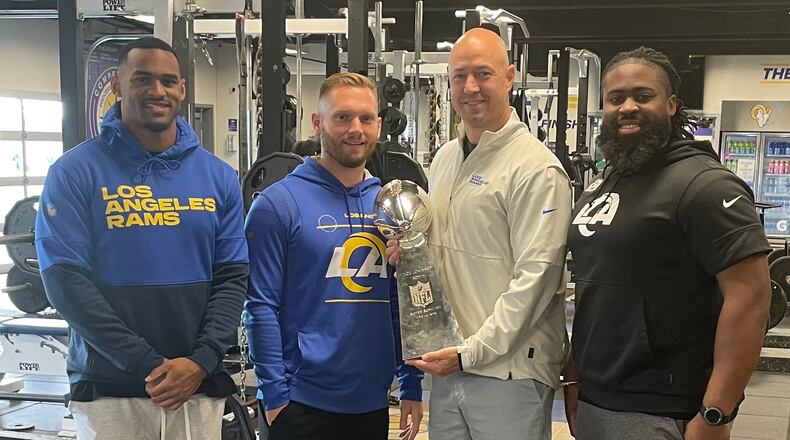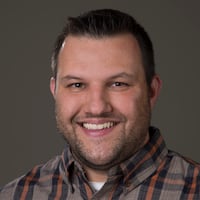The head strength coach for the Los Angeles Rams, who graduated from Beavercreek High School in 1995, might have succeeded too well at focusing only on the game itself prior to Super Bowl LVI.
“You push it down and make it business as usual so much that I spent this week trying to make sure I watched replays of the game,” he said Monday. “I had this week off so it was just like, ‘Did that happen?’”
Adding to the mental gymnastics is the fact the Rams’ victims in a 23-20 come-from-behind victory Feb. 13 were a team Lovett knows a lot about: The Cincinnati Bengals.
“I thought I’d be on my knees crying that we won this because I remember being 12 years old in 1988 and crying when the 49ers beat the Bengals,” he said. “I thought this was what was gonna happen and I’d be overcome with emotion that we won and that you achieved the pinnacle of your profession, and then what’s next? Well, it hasn’t happened like that. You’re just kind of you’re making sure that you won the game, No. 1, and then you’re trying to remember all the stories that went with it and the celebrations.
“And then now you’re kind of turning the page while trying to make sure you’re still in the moment.”
The NFL calendar marches on unabated, and Lovett’s top job is making sure the team is ready for next season, which starts at the same time for the Rams as everyone else.
“You’re moving forward, too, because we’re five weeks behind the teams that didn’t make the playoffs in terms of getting these guys ready for OTAs and (getting the coaches ready for) the combine.”
At Yellow Springs this season, the boys and girls teams both lived out @DeionSanders' "Look good, feel good/feel good, play good," mantra thanks to gear from Dave Chappelle https://t.co/vsilIusJr5 pic.twitter.com/Dzcfuf0BLe
— Marcus Hartman (@marcushartman) February 18, 2022
Lovett just finished his second season with the Rams after taking a circuitous path to the NFL.
He excelled at football and baseball at Beavercreek then played both sports at the University of Findlay.
From there it was on to Colorado State, where he majored in exercise science and thought he would become a gym teacher and coach.
He began a teaching career and spent time as a private trainer before getting the opportunity to volunteer with the Denver Broncos in 2008.
“That got us on the roller coaster,” he said. “I went to UTEP as an assistant coach, and my wife wouldn’t move down to Texas with me, so I thought I was gonna have to move back and be a teacher again. And the Broncos had made a move and let me come back as an intern, and fast forward I was full-time assistant for the last two years. We got let go after my boss retired after Tim Tebow’s magical run with us. So I ended up back into college ranks at at Georgia, Western Kentucky and Purdue. So it took me 10 years to get back to the National Football League, but it was a kind of a nice journey.”
With the Rams, he has a variety of duties, and a variety of players to work with.
There are newcomers just trying to make the squad, such as Oakwood graduate Michael Hoecht, and perennial All-Pros like Aaron Donald, the star defensive tackle who is a physical marvel at 6-foot-1, 280 pounds.
“This guy’s got so much gas and acceleration and explosiveness and the strength behind it with without any drag, without any body fat really,” Lovett said of Donald. “So I’ve never seen anything like it, and really my job was, ‘How do I not screw this guy up? How do I not get in the way of what he’s trying to achieve?’”
That includes giving Donald challenging workouts while also trying to keep him from doing too much.
“It does freak me out a little bit when it’s Super Bowl week and he’s got 425 (pounds) on his chest for an easy set of three (in bench press),” Lovett said. “I mean, that’s not something that you would advertise, but if we didn’t present a path for him to do it, it’s just like any player. If you don’t offer what they think they need, they will go somewhere else to get it. So it’s better to do it with us where there are some parameters and there’s some things that you can do to keep them safe than it would be to not offer those services.”
Earning players’ trust is paramount for Lovett, as is being on top of the latest science in building strength, endurance and recovery.
He also has to be flexible in a world where many players have their own designs on what is the best way for them to maximize their physical ability.
“Most of the elite players don’t just invest in cars and houses,” he said. “They invest in body shop practitioners, speed coaches, nutritionists, chefs — all these things.
“That’s where their money goes, so you have to be willing and open to working with those guys because ultimately, it might be me helping one of our players facilitate a program that their speed coach or their strength coach is really adamant that they do to be successful. I have no problem with that because at the end of the day, if that player wins, I win and I don’t mind it at all.”
About the Author

